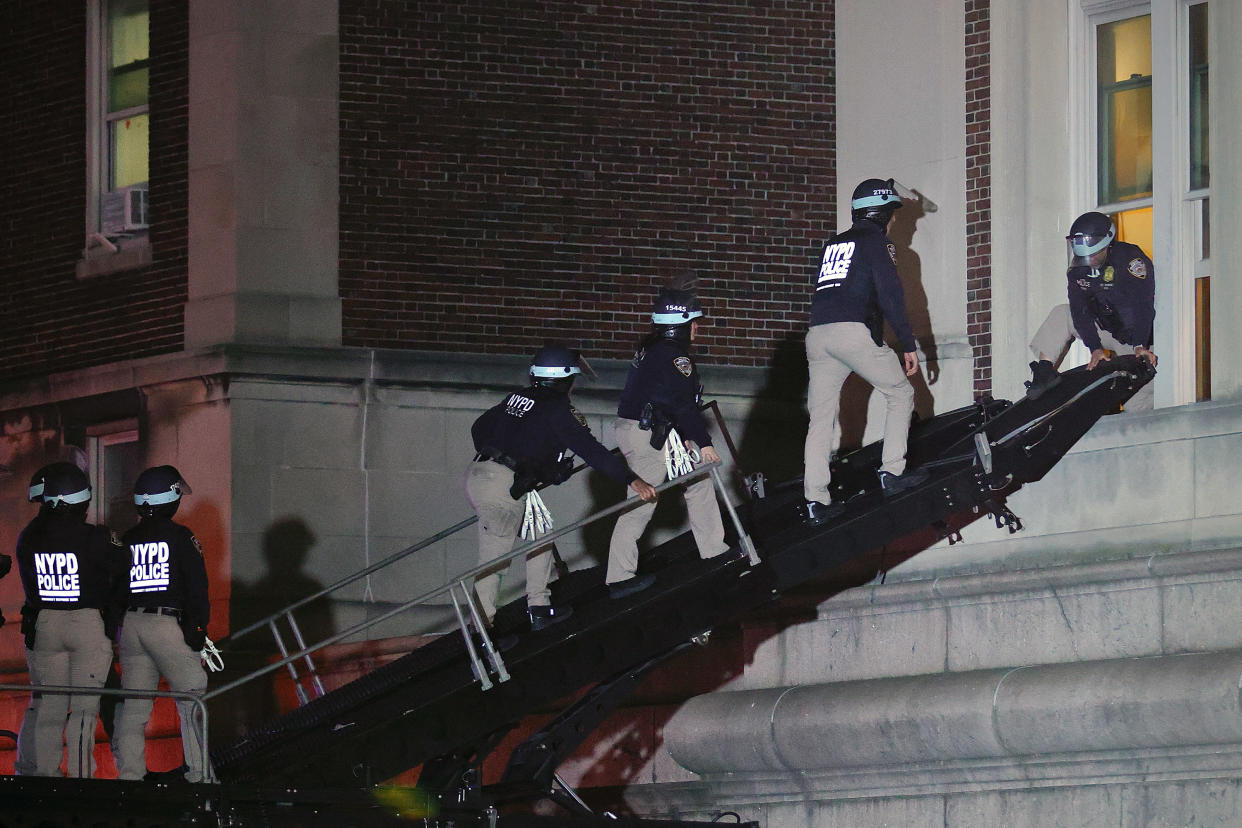Editorial: Protesters, presidents and police: Columbia University gets failing grades

Tuesday night, the world watched on live TV as the NYPD cleared out pro-Palestinian student protesters who’d taken over Columbia University’s Hamilton Hall and the quad at City College, arresting hundreds of people.
The protesters at Columbia had made the campus situation even more untenable by breaking and entering into a locked building, committing a crime and then refusing to leave. Those who occupied Hamilton Hall expected or at least should have expected that arrest was a possibility.
Commit a crime, like burglary, and you may well be prosecuted, which we are pretty sure is not what mom and dad hoped for in sending you off to college.
But even before the break-in, the level of tension over the Israel-Hamas war in Gaza had escalated with not a few Jews on campus, students and faculty alike, feeling afraid from the anti-Israel rhetoric and the anti-Zionism from some of the protesters, including among the protest leaders. No one on a college campus should have to be fearful. It’s the administration’s job to make sure of that.
And making it all worse was the rank antisemitism on display outside the campus gates by perhaps non-Columbia miscreants attracted to the commotion, including physically and verbally accosting Jews in the neighborhood.
The line between political anti-Zionism (including when expressed by Jews opposed to Israel’s actions) and hateful and dangerous antisemitism can be subtle, but the fear was still real.
We’ve said it before and we say it again. We support free speech, even when we disagree with it. We oppose hate speech and it has no place if it threatens people or advocates violence.
But in seizing the building, the protesters strayed further into the realm of action, which necessarily has fewer protections, and they understood that civil disobedience of this sort and violence against property has always carried consequences.
It’s also the case that Hamilton has been occupied at least five times in the past by student activists, and the police cleared the building in only two of them; in the other three, activists left voluntarily, usually after negotiations with the university. Even in the two instances that the police raided the building — most famously in 1968, during protests over the Vietnam War and Columbia’s role in Harlem — they did so about a week after the occupations began.
For all the faults of the protesters, Columbia President Minouche Shafik also stumbled badly throughout, allowing the situation to escalate.
She was erratic, negotiating at times and also imposing deadlines on the tent city encampment protesting ties with Israel. She called the cops once and then said that she wouldn’t do it again, ruling it out. Did that goad the faction of the protesters to test if she would call 911 again by invading Hamilton Hall? The answer was yes, and she did call the cops again when Hamilton was taken over.
This time Shafik waited only about a day to send the cops in, just as she waited only about a day to have the police clear the first encampment weeks ago. In effect, Shafik boxed herself in, eliminating the possibility of meaningful negotiation by resorting to escalation off the bat. Then reversing course and taking using force to disband the encampment off the table.
Still, the protesters’ negotiation stance of agree to all our demands about investing in Israel and the rest in exchange to ending the encampment was unlikely to produce any agreement.
The students and the administrators are not equal players here; the former have, always and forever, been idealistic, politically inclined and impulsive, as youth is. The latter are supposed to be the professionals, the clear-headed ones who can balance multiple stakeholders and interests and resolve situations diplomatically. You know, being grown-ups.
Here, the students did what students often do, and cannot claim to have imagined no repercussions. They were warned repeatedly that arrests, suspensions and expulsions were on the table. It is no surprise that the university wasn’t bluffing.
The administrators, though, put on a show of incompetence from the beginning, calling in the cops the first time made everything worse and they lost the chance to negotiate with students for a calm ending. Instead, we had a nighttime NYPD raid. We would know more about the tenor of the arrests if the cops hadn’t taken pains to keep reporters from seeing the action unfold.
Realizing the mess they’ve made, university officials at both CUNY and Columbia blame “outside agitators,” often a last-resort argument to discredit protesters. At a press conference yesterday morning, NYPD brass and the mayor put forth as key evidence the presence of a heavy bike lock the cops encountered at the door to Hamilton. As many were quick to point out, Columbia’s own public safety had previously promoted such locks and even offered a student discount.
This is a serious accusation to throw around, and the universities and cops had better actually substantiate it or lay off. In any case, the campus lockdown — which some students and faculty have called more disruptive than the encampment itself was, coming as it is during finals season — was supposed to keep outsiders out, meaning that either the authorities failed at that task or the claims can’t be upheld.
Did this have to play out like this? Fellow Ivy League school Brown was among those that negotiated an end to the encampment after what it termed “productive discussions.” It did not do so through total capitulation, but will allow students to present a formal case for a divestment vote that will occur later on. Most likely things at Brown had not gotten so heated as they did in Morningside Heights.
So the 2024 standoff has ended for now, with the NYPD having been asked to remain on campus until May 17, two days after what will be Shafik’s first graduation ceremony. We will see what happens between now and then.
___

